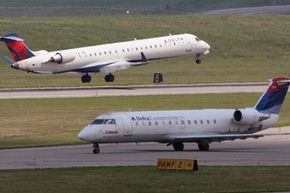Have you ever faced this common traveling dilemma: You have to get out of town -- way out of town -- for a vacation, or perhaps for a professional conference. But before you even start to think about packing that first bag, you must decide, "Should I fly or should I drive?"
The conundrum only gets more complicated if you take your trip during the summer vacation season, when fuel prices traditionally spike.
Advertisement
This article will offer advice to help you save time, money, and your precious sanity when it comes to taking that next long-distance trip. While it's great to save money, you should be sure to consider all the factors that might weigh on the quality of your trip.
Weighing all the costs
Making the smartest choice between driving and flying requires that you juggle multiple factors and figure out how important each is to you: overall monetary cost; time spent traveling versus being at your destination; how much will either mode of transit aggravate you in the case of delays or unpleasant conditions (i.e., security pat-downs and obnoxious passengers versus highway traffic jams, bad weather or inept motorists). And let's not forget the cost that is not immediately visible, but that many people consider of ultimate importance to the planet: the environmental footprint you leave in the form of carbon emissions, whether you're tooling down the highway or cruising at 35,000 feet (10.7 kilometers).
Putting all these factors together and optimizing them is a complex equation to be sure. So first, we'll provide you with some of the inputs: (costs between types of vehicles)
- How many people will be traveling? If you're driving, the more people you bring along, the more economical per-person the trip becomes, generally speaking. If flying, each person has to buy a ticket, which can cause the trip price to balloon dramatically.
- Current gasoline prices -- assuming you don't drive an all-electric vehicle, your fuel expenses will vary according to what's happening with the price of gasoline when you travel.
- Many people are now considering the environmental cost of their travels and choosing their transportation accordingly. Air travel typically produces more greenhouse gases than driving, but your vehicle and the route you take could make a big difference. Also, a few companies allow you to purchase carbon "offsets" intended to mitigate the carbon emissions caused by your ground or air travel.
- Remember to include the non-fuel costs of driving, such as tolls, lodging, food, and wear and tear on the vehicle.
- Will you need a vehicle at your destination? If so, be sure to include car rental fees on the "fly" side of your cost comparison
- The value of your time; let's face it, many folks view seated travel time as an opportunity to get stuff done -- to read, to stay caught up on work, or just to finish some Sudoku puzzles. Your choice of whether to leave the driving (or flying) to someone else will have an impact on how you can use your travel time.
In the next section, we'll look at how to figure out which is cheaper -- driving or flying -- using the help of some high-tech shortcuts.
Advertisement



